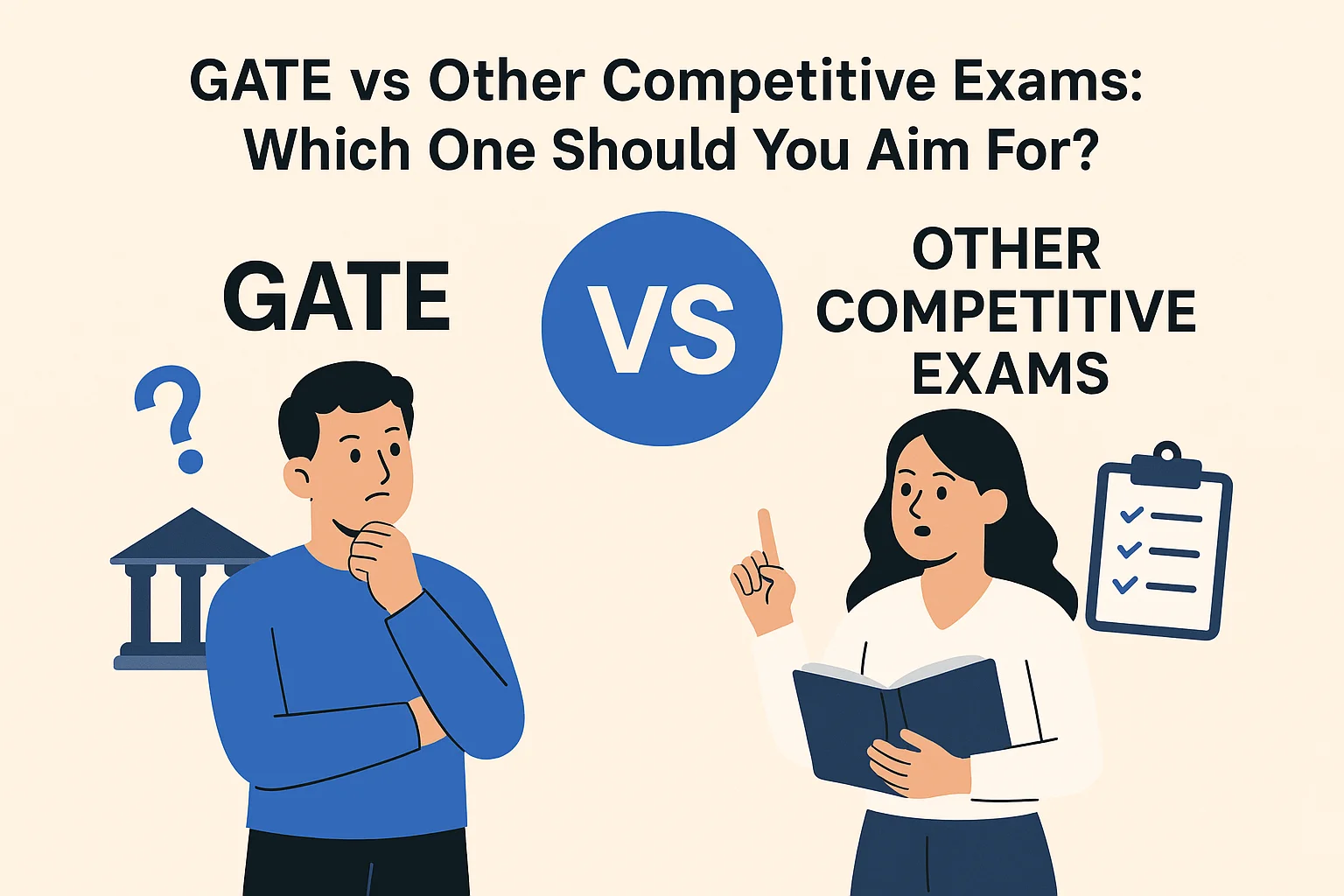GATE vs Other Competitive Exams: Which One Should You Aim For?
When students reach the final stages of their undergraduate journey in engineering or science, one of the most important decisions they face is choosing the right competitive exam for their future. Among the many options available, the GATE exam often stands out as a prestigious gateway to higher education and career opportunities. But with other exams like CAT, GRE, UPSC, or various public sector recruitment tests also in the mix, the dilemma becomes even more complex. This article explores how the GATE exam compares to other competitive exams and which one may align better with your goals.
Understanding the GATE Exam
The Graduate Aptitude Test in Engineering, or GATE, is conducted annually for candidates from engineering, science, and technology backgrounds. It is primarily designed for those who aspire to pursue higher studies like MTech or MS in top institutes such as IITs, NITs, and IISc, or for those aiming to secure jobs in public sector undertakings (PSUs).
A candidate must first go through the GATE exam eligibility criteria, which generally require completion of a bachelor’s degree in engineering, technology, or science-related fields. This makes it highly focused on technical and analytical skills rather than general aptitude alone.
The GATE exam pattern is also unique. It consists of multiple-choice and numerical answer type questions, testing both technical knowledge and general aptitude. Unlike exams that focus solely on reasoning or language, GATE places heavy emphasis on subject-specific concepts.
The GATE exam syllabus is another factor that differentiates it from others. It is vast, covering core engineering subjects, mathematics, and general aptitude. Depending on your discipline, you must prepare deeply in technical areas, which makes it demanding but also rewarding for those with strong subject expertise.
GATE vs UPSC
One of the most common comparisons is between the GATE exam and UPSC Civil Services. Both are prestigious, but they cater to very different career goals. UPSC is geared towards administrative services, where general awareness, current affairs, and analytical writing dominate the preparation. GATE, on the other hand, is technical and research-oriented.
-
UPSC requires extensive coverage of history, geography, polity, economy, and current events.
-
GATE requires mastery of technical subjects and problem-solving skills in your chosen stream.
-
While UPSC offers careers in governance and administration, GATE leads to opportunities in research, PSUs, or advanced education.
Thus, if your passion lies in contributing to public policy or administration, UPSC is the way forward. If you are inclined towards technology and innovation, GATE is the better choice.
GATE vs GRE
Another comparison that students often make is between the GATE exam and the GRE, especially for those considering studies abroad. The GRE is widely accepted for master’s programs across the globe, particularly in the US and Europe.
-
The GRE tests verbal reasoning, quantitative reasoning, and analytical writing.
-
GATE tests engineering fundamentals, mathematics, and aptitude.
-
GRE has no specific academic discipline requirement, while GATE exam eligibility restricts it to technical and science fields.
If your dream is to study abroad in a more diverse set of fields, GRE is suitable. However, if your goal is to pursue a postgraduate program in Indian institutes of national importance or to secure PSU jobs, then GATE is the right fit.
GATE vs CAT
The CAT exam is the gateway to management programs like MBA in prestigious IIMs and other top business schools. Students often wonder whether to go for GATE or CAT since both are highly competitive and lead to rewarding careers.
-
CAT focuses on quantitative ability, logical reasoning, and verbal ability.
-
GATE exam pattern is more technical and discipline-specific.
-
CAT leads to careers in corporate management and business leadership.
-
GATE opens doors to technical specializations, PSUs, and academia.
If you aspire to move into managerial roles and business decision-making, CAT may be your path. But if your strength lies in technical subjects and you wish to explore research or engineering roles, GATE is undoubtedly more suitable.
GATE vs State and Central PSU Recruitment Exams
Apart from the GATE exam, many students also appear for direct recruitment exams conducted by state and central PSUs. These exams often focus on technical knowledge but may also include reasoning and general awareness.
The advantage of GATE is that many top PSUs like ONGC, NTPC, and BHEL directly recruit based on GATE scores. This makes it a single powerful exam for multiple opportunities, reducing the need to sit for different recruitment tests.
Key Factors to Decide
When trying to choose between GATE and other competitive exams, it is important to analyze your long-term goals. Here are some guiding points:
-
If you want to pursue research, higher education, or teaching in India’s top institutes, the GATE exam is the best choice.
-
If you are more inclined towards administrative services and governance, UPSC will suit you.
-
If your career plan involves studying abroad, GRE offers more flexibility.
-
If you dream of becoming a business leader or corporate strategist, CAT is the right direction.
-
If you want to work in PSUs or secure a stable technical government job, a good GATE score can help you reach there.
Challenges of the GATE Exam
It is also important to acknowledge the challenges. The GATE exam syllabus is extensive and requires consistent effort for at least a year of preparation. The exam pattern is designed to test both depth and application of knowledge, making it tougher than general aptitude exams. Moreover, competition is intense, with lakhs of candidates applying every year for limited seats or jobs.
However, the rewards justify the effort. Higher education through GATE can lead to specialized research opportunities, international exposure through fellowships, and highly respected PSU jobs that offer both financial security and professional growth.
Conclusion
Choosing the right competitive exam is not about which one is tougher or more prestigious but about which one aligns with your personal strengths and aspirations. The GATE exam is unmatched for those passionate about technical fields and seeking opportunities in higher education, research, or PSUs. Other exams like UPSC, GRE, and CAT serve different career aspirations and require different skill sets.
Ultimately, the decision comes down to where you see yourself in the future. If your heart lies in engineering, science, and innovation, preparing for the GATE exam is a wise investment. And once you’ve made your choice, registering through GoFillForm is the simplest way to begin your journey with confidence and ease.





